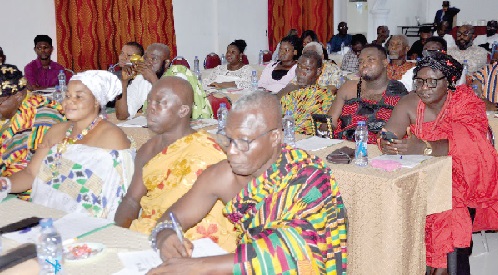
Hasten work on Eastern Corridor, Keta Harbour projects : Volta, Oti regions conference participants to govt
Participants at the just-ended conference on “Building an Inclusive Nation - Dialoguing with Volta and Oti Regions,” organised by the National Peace Council in Ho, have urged the government to hasten the completion of work on the Eastern-Corridor Road project and all other major roads under construction in the two regions.
They also highlighted the need to prioritise the construction of the Keta Sea Defence Expansion Project and the Keta Port Project to create jobs for the teeming unemployed youth in the region.
Advertisement
The participants similarly asked the government to resource the Ho Teaching Hospital (HTH) and put up a Regional Hospital in the Oti Region, upgrade the Ho Sports Stadium to international standard and replicate the same in the Oti Region.
The conference also deliberated on the ‘Togoland Study Group’ issues, ‘The Concept of Peaceful Resolution as Opposed to Conflicts’, ‘Multi-ethnic, Divided Societies, Multi-Culturalism, and the Quest for Harmony,’ in addition to ‘The Rise and Currency of Multilateralism and Regional Integration as Opposed to Secession’.
The meeting was a follow-up to a series of dialogue sessions the National Peace Council organised in September last year in some communities in the Volta and Oti regions, to understand the origin, nature and implications of the perception of marginalisation of the Ewe ethnic group.
In a communiqué issued last week Friday at the end of the conference, the about 60 participants, made up of chiefs, queenmothers, the Clergy, academia, representatives of civil society, women and youth groups, maintained that Ghana was a multi-ethnic, multi-religious, multi-lingual, and multi-cultural society, saying the exploitation of those social divisions was a risk to inclusion, cohesion and peaceful coexistence.
Citizenship
Touching on citizenship, the communiqué reaffirmed that the Ewe and other ethnic groups from the Volta and Oti regions were bonafide Ghanaians, whose forebears mainly inhabited the Trans-Volta Togoland and joined the Gold Coast through a plebiscite in 1956 to form Ghana on March 6, 1957.
It expressed misgivings over the long-held erroneous perception among some Ghanaians that the Ewe people were aliens or non-indigenous Ghanaians, who came from Togo to join Ghana after independence.
The communiqué noted that such an erroneous misinterpretation of history by some tribal bigots and demagogue politicians had occasioned adverse discrimination against the Ewes in the issuance of birth certificates, national identity cards, passports, voters' registration and during elections.
On employment, the communiqué condemned instances in which very qualified and public-spirited citizens of the Volta and Oti regions were sacked from their jobs and replaced by people from other ethnic groups, saying the two regions did not get a fair share of appointments to public offices.
Inland checkpoints
Further, it called for the removal of the nuisance of “in-land, fear-invoking security and immigration barriers and checkpoints” in communities such as Asikuma, Leklebi, Liati, Sogakope and Juapong, saying security should rather be strengthened at the borders.
The communiqué said some Ewes were forced to speak Twi at such checkpoints to prove their Ghanaian citizenship, which was unacceptable.
The communiqué mentioned the September 2020 violent attacks on some vital state installations in the Volta Region, which led to the arrest and incarceration of many young men, with 52 now languishing in prisons for years without trial, and said their long detention without trial was unfair.
Email: [email protected]




